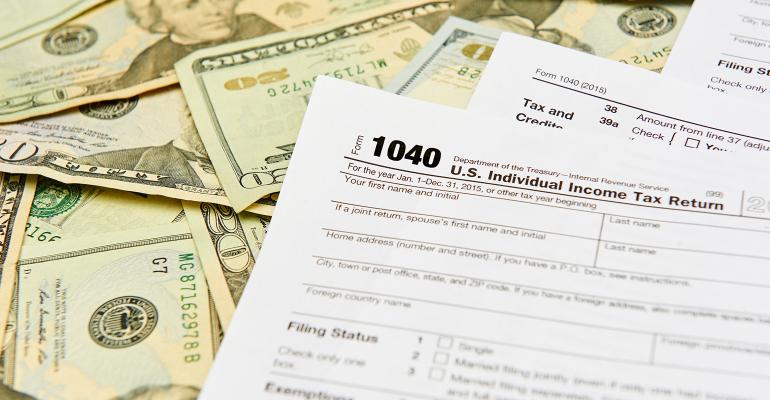(Bloomberg) -- Think you pay too much in taxes? You probably do, if you are like the 46% of Americans who say they’re looking to get a refund check from the IRS this year.
A refund is, as financial planners like to say, an interest-free loan you gave to the U.S. government. But most taxpayers don’t see it that way. Just 7.4% of them agreed with the statement “I don’t like getting tax refunds because it means I overpaid throughout the year” in a nationally representative survey of 1,039 taxpayers by LendingTree Inc. released Monday.
Many consumers overpay as a sort of enforced savings program, and to ensure they don’t have to write a big check to the IRS at tax time. On average, refunds are around $3,000. That’s a nice check to get, but many are now worried about how far their cash will go at a time when inflation is accelerating. Rather than overpay in taxes, using that money during the year to pay off high-interest rate credit cards is one way to try and ease any financial pressures, financial advisers say.
Now is a good time, early in the year, to check that you are having enough tax withheld, or too little, particularly if you’ve had any big life changes in the past year, such as getting a new job, getting married or divorced, buying a home or retiring. Those who want to try and fine tune payments so they don’t get a refund can use the IRS tax withholding estimator; you’ll need last year’s filing on hand to fill it out.
Financial planner Marguerita Cheng of Blue Ocean Global Wealth points to other helpful calculators from the Center on Budget and Policy Priorities’s Get it Back campaign, and from TaxAct. Cheng said she always encourages clients who are freelancers, consultants and gig economy workers to join the (free) freelancers union, where they can find good tax information.
More Americans plan to use tax refunds to help build or beef up a cash cushion this year, according to the LendingTree survey. Forty-six percent said refunds would go into savings, up from about 40% in the last two annual surveys. The second-most cited use for a refund was to pay down debt, at 37%.
Among Gen Z taxpayers — those between the ages of 18 and 25 — 62% said they’d send the money into savings. But Gen Z taxpayers were also the most likely to say they would invest their tax refund, at 14%. Slightly more than 10% of millennials said that, along with 7% of Gen X-ers and 6.7% of Baby Boomers. (The survey was taken between Feb. 7 and 10, when the S&P 500 was more than 6% higher than it was as of March 11, and before Russia invaded Ukraine.)
Many Americans don’t have the luxury of investing in the stock market, and will devote their tax refund to paying basic expenses such as rent or a mortgage, and groceries. Among consumers making less than $35,000 a year a hair above 30% said a refund would go to pay such expenses. For those with household income of $100,000 or more the percentage was 15.6%.
Far fewer Americans said this year they would take out a personal loan or use a credit card to pay their taxes – 12%, down from 22%. Even so, “one in five Americans worry that they won’t be able to afford their tax bill this year,” the survey found.
To contact the author of this story:
Suzanne Woolley in New York at [email protected]





